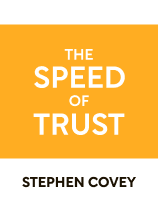

This article is an excerpt from the Shortform book guide to "The Speed of Trust" by Stephen M. R. Covey. Shortform has the world's best summaries and analyses of books you should be reading.
Like this article? Sign up for a free trial here .
What are Stephen Covey’s five waves of trust? How can you use the waves of trust to build stronger relationships at work and in your personal life?
According to The Speed of Trust author Stephen Covey, there are five building blocks of trust that, once achieved, will lead to strengthening existing relationships and fostering new ones. Covey calls these building blocks the waves of trust.
Read on for a quick summary of Covey’s five waves of trust and imagine how each could apply to your own life.
Covey’s Five Waves of Trust
Trust makes existing relationships more productive and efficient, opens the door to new relationships and opportunities, builds loyalty and respect, and fosters innovation and collaboration. In short, more than any other asset, trust is the key to success. Covey explains that the benefits of trust begin within you and radiate outwards as waves of trust. We’ll briefly examine each wave of trust.
Wave One: Trust Yourself
If you want other people to trust you, you first need to trust yourself. According to Covey, self-trust is a function of harmony between your principles, your motives, your capabilities, and your track record. Essentially, self-trust comes from behaving in a way that reflects your values. Any dissonance between the person you want to be and your behavior can erode your self-trust.
Wave Two: Interpersonal Trust
Once you’ve worked on the four building blocks of trust within yourself, the harmony between your nature and your proficiency will be clear to those around you. If you’re a trustworthy person, you consistently demonstrate your values, and people notice. This consistency builds trust because people know what to expect from you. On the other hand, Covey notes that disrupting this consistency with a violation of your nature (stealing, lying, cheating, and so on) is the fastest way to lose someone’s trust.
Wave Three: Team Trust
Groups of people—such as families, school classes, businesses, and so on—function best when trust is high between members. Covey notes that too often, people only think about the importance of team trust when they notice the symptoms of its absence. He highlights the following symptoms of low team trust:
Political Tactics. When group trust is low, people often talk behind each other’s backs, compete for status, and question each other’s principles and motivations. Time and energy spent here detract from productivity and group culture.
Rules and Red Tape. Covey notes that organizations often try to make up for low group trust with extensive rulebooks, elaborate systems of checks and balances, and redundancy in operations. But no amount of rules can make up for a lack of trust. In fact, if you try to replace trust with rules, you can incur trust taxes in efficiency, productivity, and group culture because the constraints stifle creativity and ingenuity and can also make people feel resentful and defensive.
Wave Four: Reputation
The reputation wave encompasses the way your organization is viewed by the rest of the world. Just as an individual gains others’ trust by consistently acting with integrity, Covey explains that people are more likely to trust an organization when they see alignment between its nature (mission statement, values, and so on) and its track record.
Wave Five: Collective Trust
The final wave of trust is collective trust. Trust is integral to a functioning society, claims Covey. Yet modern society is changing so quickly that knowing when and how to extend trust can be difficult. For example, thanks to technology, much of society operates on a global scale. Companies can hire people to work as a team from all corners of the world. Consumers can go online and conduct extensive research before choosing where to spend their money, with exponentially more options. But as our personal and professional waves grow larger, relationships can feel more and more impersonal. Therefore, people gravitate towards organizations and individuals that demonstrate their trustworthiness.

———End of Preview———
Like what you just read? Read the rest of the world's best book summary and analysis of Stephen M. R. Covey's "The Speed of Trust" at Shortform .
Here's what you'll find in our full The Speed of Trust summary :
- Why trust is the ultimate key to success
- A roadmap for building and leveraging trust
- An explanation of Steven Covey's “four cores of credibility”






